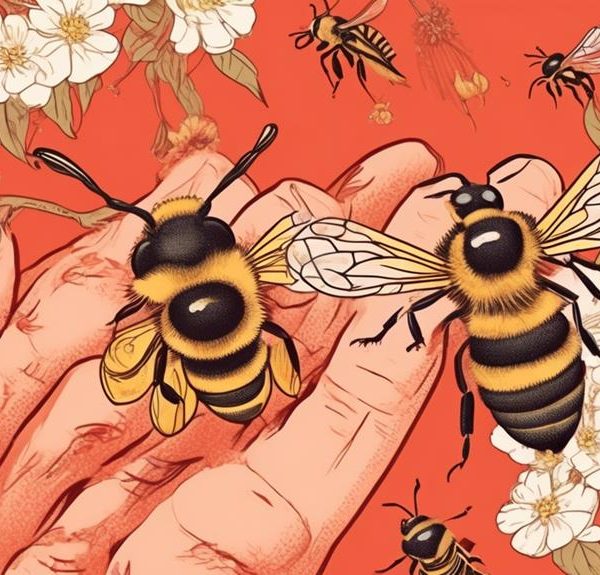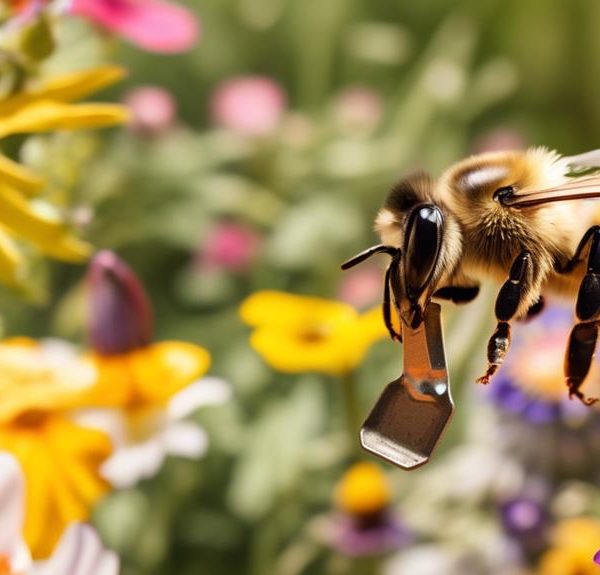Unmask the intriguing secret behind why you're allergic to bee stings but not honey – a paradox that's not as puzzling as you might think.
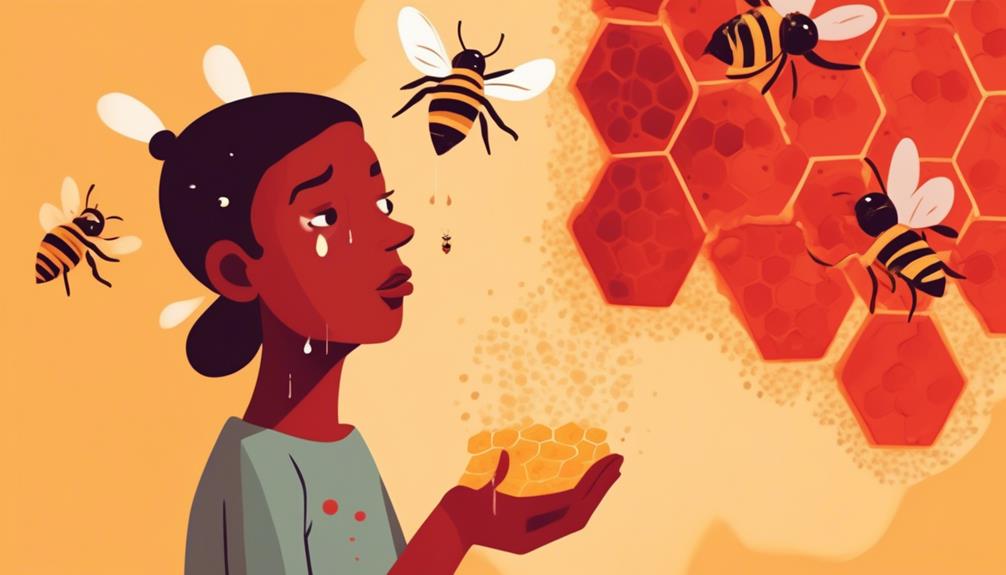
Why Am I Allergic to Bee Stings but Not Honey
Like a medieval alchemist trying to turn lead into gold, you're trying to untangle the mystery of why you're allergic to bee stings but not honey.
It's a curious paradox that has you scratching your head, isn't it? After all, both come from bees, so it would seem logical that if you're allergic to one, you'd be allergic to the other.
But, as you'll soon discover, the answer lies not in the bees themselves, but in the complex chemistry of their stings and the sweet substance they produce.
Stay tuned, as we're about to unravel this mystery together.
Key Takeaways
- Bee sting allergies occur when the immune system reacts to bee venom, triggering the production of specific antibodies.
- Honey does not cause allergies because it does not contain the allergenic proteins found in bee venom.
- The proteins in honey are smaller and simpler than those in bee venom, and the enzymatic digestion process during honey production breaks down allergenic proteins.
- Differentiating between allergic reactions to bee stings and honey is important, as bee sting allergies can lead to severe systemic reactions called anaphylaxis, while allergic reactions to honey are typically mild.
Understanding Bee Sting Allergies
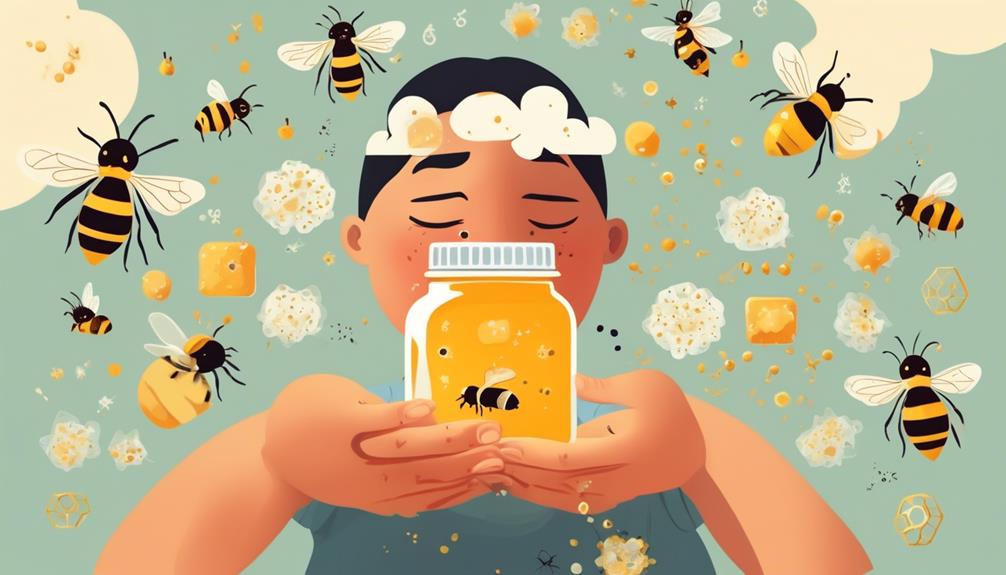
To fully comprehend bee sting allergies, it's crucial to understand that they occur when your body's immune system overreacts to the venom injected by the bee. This overreaction is your body's defense mechanism against the foreign substance, which, in this case, is the bee venom.
When you're stung, the venom enters your bloodstream, triggering your immune system to produce antibodies called Immunoglobulin E (IgE). These antibodies are specific to the bee venom, and they're designed to fight it off. The next time you're stung, these IgE antibodies recognize the venom and signal your immune system to release chemicals like histamine. It's these chemicals that cause the symptoms of an allergic reaction, which can range from mild to severe.
It's important to note that not everyone who gets stung by a bee will have an allergic reaction. It all depends on how your immune system responds to the venom. Some people may experience a mild reaction, while others may go into anaphylactic shock, a severe and potentially life-threatening allergic reaction.
Understanding these processes can help you manage and respond to potential bee sting allergies effectively.
Composition of Honey
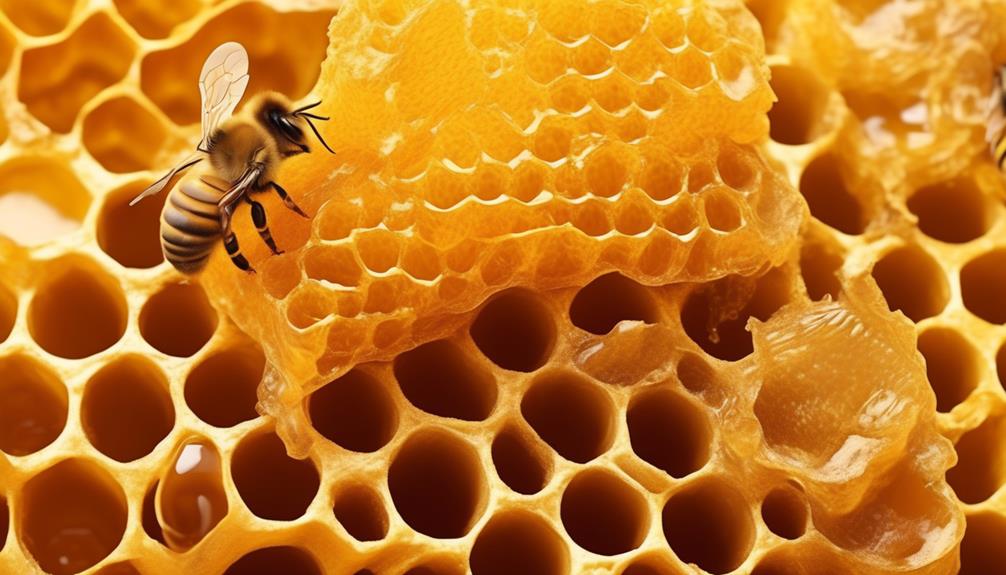
Diving into the composition of honey, you'll find it's a complex, naturally sweet substance made primarily of sugars, but also containing traces of vitamins, minerals, amino acids, and antioxidants. The sugars found in honey, which constitute about 80% of its content, are mainly fructose and glucose. This high sugar content is what gives honey its sweet taste and its energy-providing properties.
In addition to these simple sugars, honey also contains small amounts of a variety of other substances. For instance, you'll find traces of vitamins such as B6, thiamin, niacin, riboflavin, and pantothenic acid. Minerals present include calcium, copper, iron, magnesium, manganese, phosphorus, potassium, and zinc. These contribute to honey's reputation as a nutritious food.
Furthermore, honey contains numerous antioxidants, including phenols, enzymes, and compounds like flavonoids and organic acids. These antioxidants have been linked to reduced risk of heart attacks, strokes, and some types of cancer. They may also promote eye health.
Lastly, honey has about 18% water and small amounts of pollen, which can vary depending on the type of flowers the bees have been foraging on. Despite its complexity, honey's composition is remarkably consistent, making it a stable, long-lasting food source.
The Biological Reaction to Bee Stings
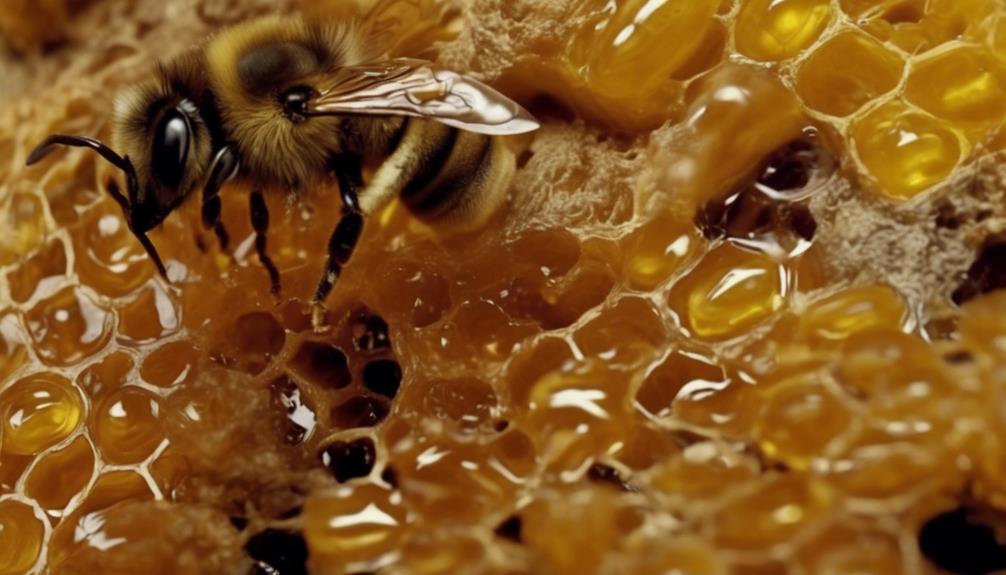
While the composition of honey is complex and nutritious, it's fascinating to note that the bees responsible for this sweet substance can also cause a potent biological reaction in humans through their stings. When a bee stings, it injects a venom called apitoxin into your skin. This venom is a cocktail of proteins and peptides, which can cause local inflammation and pain.
Your body's immune system reacts to these foreign substances by releasing chemicals like histamine. This release can lead to typical symptoms such as redness, swelling, and itching. In most people, this reaction is localized and temporary. However, if you're allergic to bee stings, your immune system overreacts. It can cause a more severe, systemic reaction that may result in difficulty breathing, a drop in blood pressure, and even anaphylaxis, a life-threatening condition.
Now you might wonder why you can tolerate honey but not bee stings. The simple explanation is that the allergenic proteins in bee venom aren't present in honey. So, while a bee sting can trigger an allergic reaction, consuming honey typically does not.
Why Honey Doesn't Cause Allergies
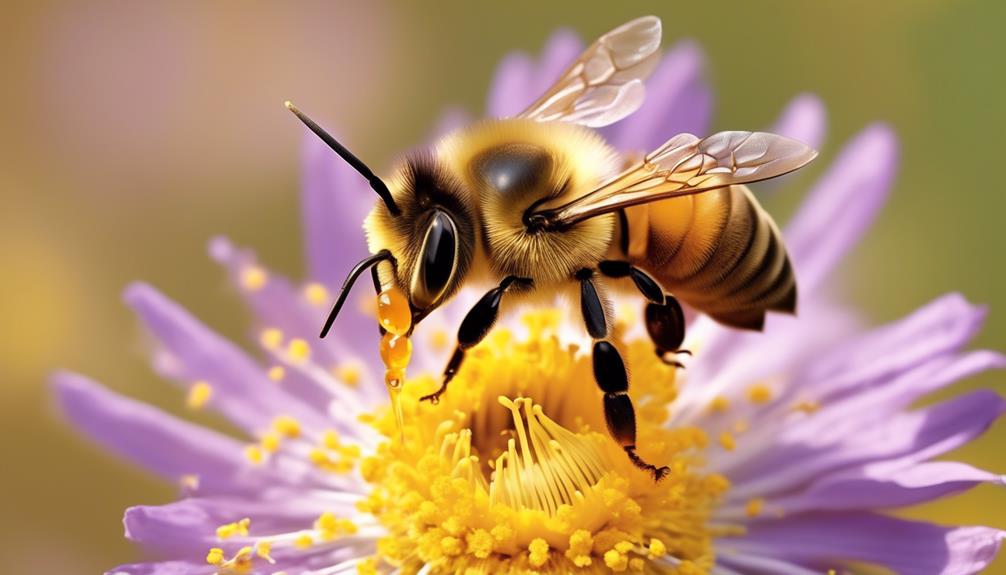
Now, you may be curious about why consuming honey doesn't cause the same allergic reactions as a bee sting. The answer lies primarily in the difference between what's in a bee sting and what's in honey.
Bee stings contain venom, a complex mixture of proteins and peptides that causes an immune response in your body. If you're allergic, your immune system overreacts to these proteins, triggering a severe reaction. The proteins in bee venom are large, complex molecules that your immune system recognizes as foreign and potentially harmful.
Honey, on the other hand, is made from nectar collected by bees from various flowers. It's primarily composed of sugars, with tiny amounts of proteins, enzymes, amino acids, minerals, and vitamins. The proteins found in honey are much smaller and simpler than those in bee venom. They're also different in structure and function, so your immune system doesn't recognize them as threats.
Furthermore, the process of making honey involves enzymatic digestion, which breaks down any allergenic proteins into smaller, non-allergenic pieces. Thus, even if you're highly allergic to bee stings, you can usually eat honey without any adverse reactions.
Differentiating Allergic Reactions
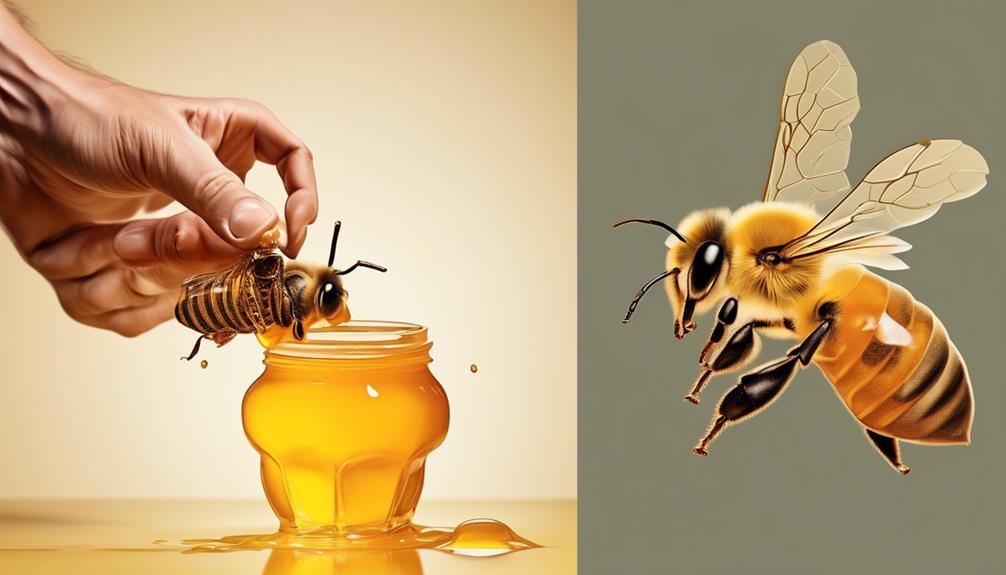
Understanding the stark differences between the allergic reactions caused by bee stings and honey consumption, let's explore how to differentiate various allergic reactions, particularly those triggered by bee venom.
When you're stung by a bee, your immune system may overreact to the venom, leading to symptoms ranging from mild to severe. Mild reactions typically involve localized swelling, redness, and itching at the sting site. More severe systemic reactions—known as anaphylaxis—may lead to difficulty breathing, a drop in blood pressure, and potentially, loss of consciousness.
On the other hand, honey doesn't usually trigger allergic reactions due to the pasteurization process, which kills off potential allergens. If you've had an allergic reaction to honey, it's likely because the honey was raw and contained traces of bee pollen or bee protein. However, these reactions are typically mild, manifesting as mouth or throat irritation and rarely progress to anaphylaxis.
It's crucial to recognize these differing reactions as they require different responses. Mild reactions can often be managed with OTC antihistamines, while anaphylaxis is a medical emergency requiring immediate attention.
Frequently Asked Questions
Can Bee Sting Allergies Be Cured or Will I Have Them for Life?
You're allergic to bee stings because your body's immune system overreacts to the venom. It's not the same as a honey allergy, which comes from bees' nectar, not venom.
As for curing your allergy, it's unlikely. Allergies typically last a lifetime, but symptoms can be managed. Immunotherapy, such as allergy shots, can help your body become less reactive.
Always consult with a healthcare professional for personalized advice.
Are There Any Other Bee Products That Could Cause an Allergic Reaction Similar to a Bee Sting?
Yes, other bee products can potentially trigger similar allergic reactions.
Bee pollen, for instance, is known to cause symptoms like itching, swelling, shortness of breath, light-headedness, or even anaphylaxis in some people.
It's crucial to remember that everyone's immune system reacts differently. Therefore, even if you're not allergic to honey, you might still react to other bee products.
Always be cautious when trying new products.
How Can I Prevent Bee Stings to Avoid an Allergic Reaction?
To prevent bee stings, you should:
- Avoid wearing bright colors and strong scents, as these attract bees.
- Don't walk barefoot in grassy areas where bees might be foraging.
- If you see a bee, don't swat at it; this could provoke it. Instead, slowly move away.
- Keep food covered outdoors to deter bees.
- Lastly, if you're highly allergic, consider carrying an epinephrine auto-injector for emergency situations.
Is There a Correlation Between Bee Sting Allergies and Allergies to Other Insects?
Yes, there's often a correlation between bee sting allergies and allergies to other insects.
You're allergic to the venom insects inject, not the insects themselves. Different insects have different venom compositions, but they can share similar proteins, triggering similar allergic responses.
If you're allergic to bee stings, you may also be allergic to stings from wasps, hornets, or yellow jackets. However, it's not guaranteed, as individual allergic responses can vary significantly.
How Often Should I Get Tested for a Bee Sting Allergy?
You should get tested for a bee sting allergy if you've had a severe reaction before.
After that, it's not necessary to retest regularly unless your symptoms change.
However, if you're exposed to bees often, you might want to get retested every few years to make sure you're still safe.
It's important to remember that allergies can develop or change over time, so it's best to stay vigilant and consult with your doctor.
Conclusion
So, you're allergic to bee stings but not honey. This is because bee venom, which triggers your allergic reaction, isn't present in honey. Your body reacts to proteins in the venom, causing symptoms like swelling and itching.
Honey, however, is made from nectar, not venom, and lacks these proteins. Therefore, you can enjoy honey without fear of an allergic reaction.
It's important to understand these differences to manage your allergies effectively.

